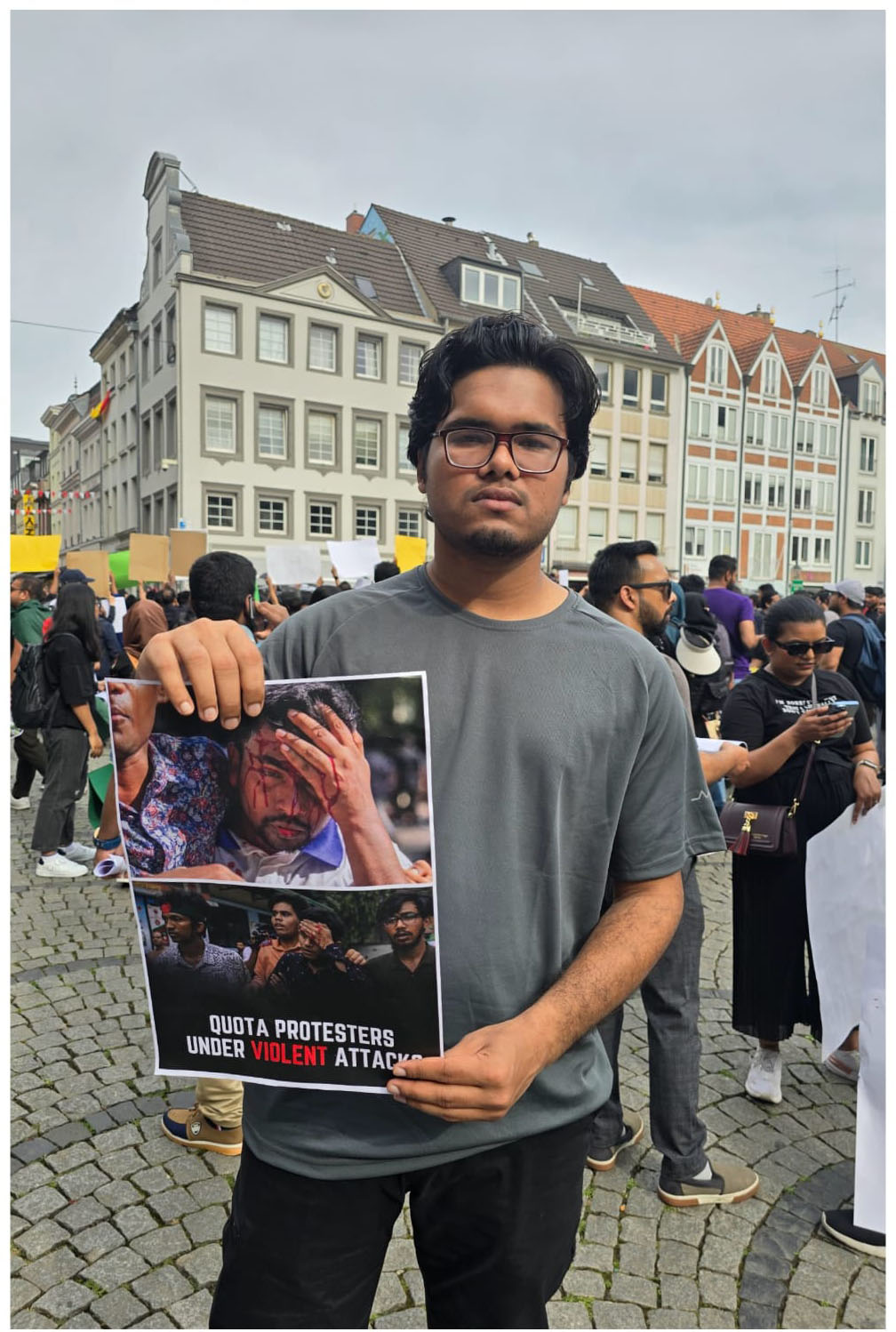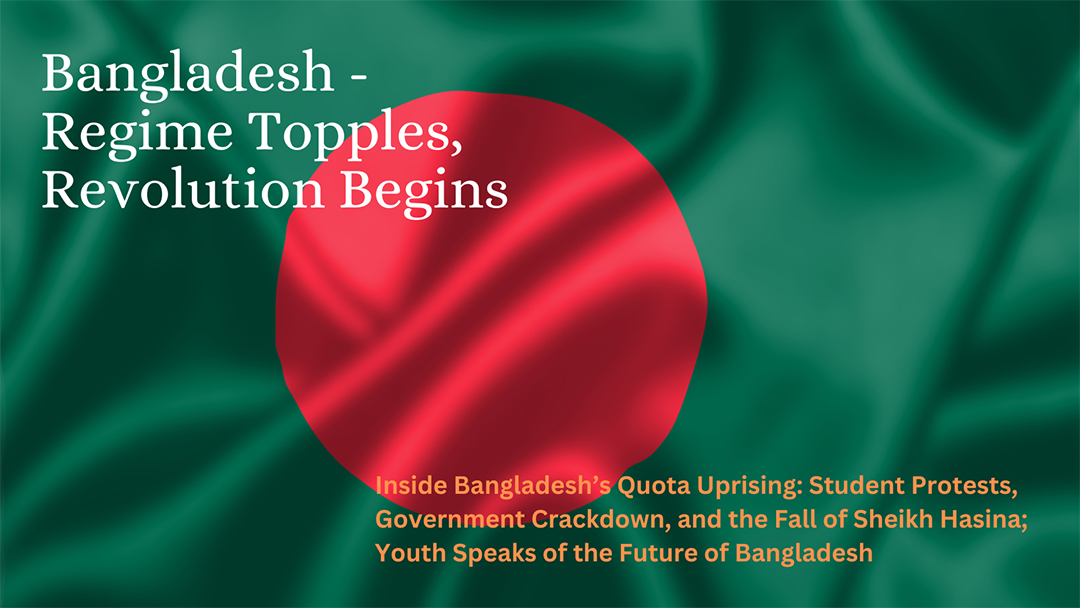Virulent slogans, police-civilian skirmishes, curfew imposed, internet services shut down- here was Bangladesh in the past month. The mayhem uprooted from a court’s ruling to reinstate a 30% employment quota for the children of independence fighters in the war of 1971.
Breaking into the streets, students-led protests turned into blockades, primarily targeted at the quota system, further inflaming the situation. Later, the country’s supreme court gave the verdict of cutting down the quota to 7%, to which protests were suspended for two days.
Resuming these protests triggered a brutal response by the then government: from mass arrests, student killings, and teargas use to enforced disappearances, several ways were employed to disperse the protestors. As per media reports, the grisly clashes between security forces and the public led to more than 215 deaths, around 20,000 injuries and approximately 10,000 arrests.
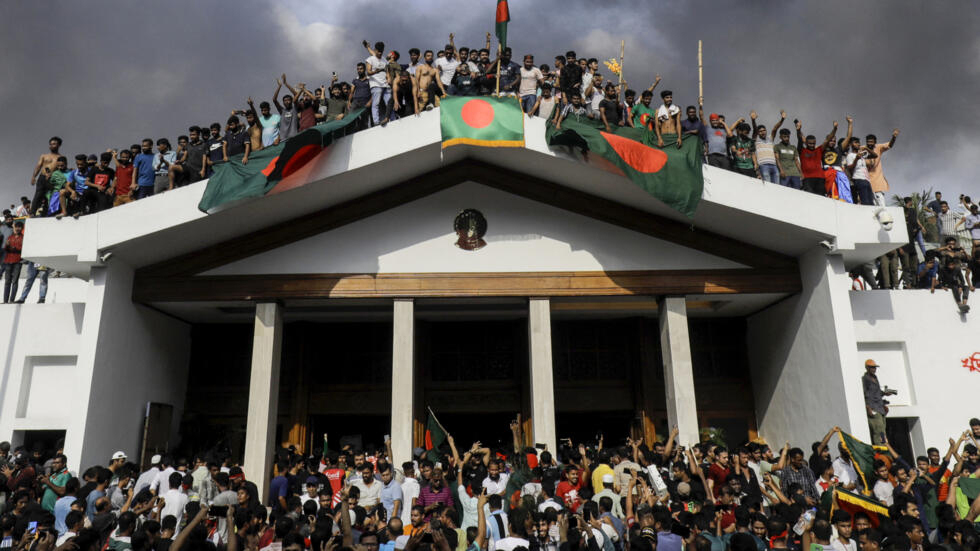
The take over of the Bangladesh Parliament
The aggressive governmental stance shaped the protests into a popular mass movement as civil society members, human rights activists, writers, artists, lawyers, parents, professionals and opposition political parties joined hands with the students; it was a lull before the storm.
The 5th of August dawned upon Bangladesh with the world’s longest-serving female prime minister, Sheikh Hasina Wajid, writing her resignation and fleeing the country as the members of the movement headed to Dhaka under the title of “Long March To Dhaka”.
Onwards, the military took control of the country. Afterwards, negotiations unfolded as the interim government formed, led by the Nobel Laureate, Dr.Mohammed Yunis Khan.
In the wake of unrest in Bangladesh, protests were staged in Germany by Bangladeshi citizens to demonstrate support for the student movement. In this regard, Margalla Tribune spoke to the protestors. Below is a conversation with 23-year-old Md Tamim Khan, and Zim, students currently enrolled at a German universities. Here is an extract from their dialogue.
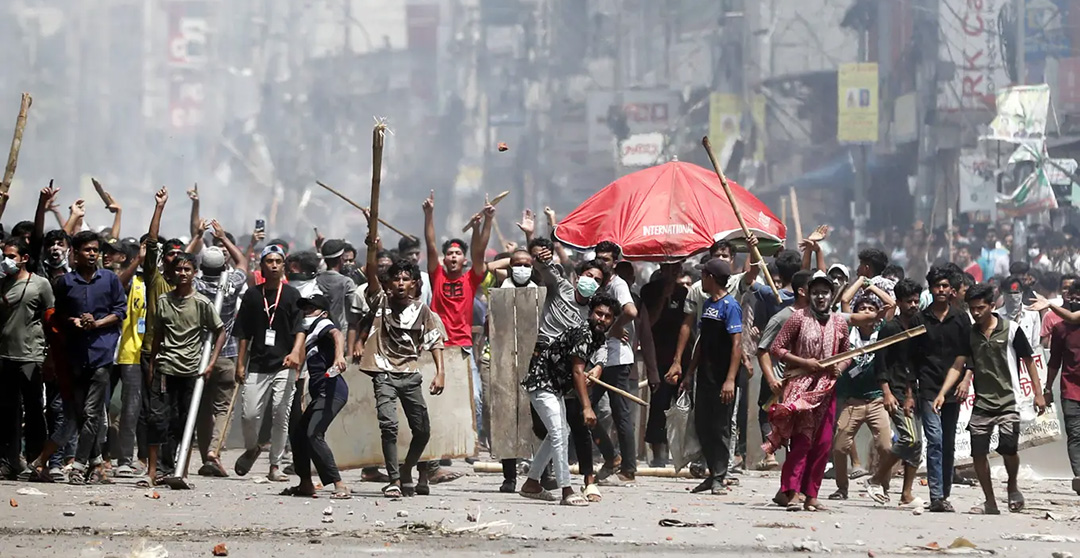
The unstoppable students force
MT Team: How did you feel about the socio-economic situation in BD before coming to Germany?
Tamim: Two years ago, I was residing in Bangladesh, and the majority of the population had been leading a life under the line of poverty. It was believed that the government was in the corrupted hands.
MT Team: In the previous few weeks, Bangladesh has observed violence and clashes. How did this situation impact your well-being & mental health?
Tamim: As a Bangladeshi, I also love my home country. My semester exams commenced on the 15th of July, but the unrest in BD grabbed all my concentration. Day and night, I had been puzzling my fingers over the screen to keep myself updated on the ongoing situation. I could not detach myself from the updates. I stood active on news portals, as well. Without a shadow of a doubt, it took a toll on my mental health.
MT Team: Where were the protests organised in Germany? Who organised them? Were the protestors only students or did some Bangladeshi professionals also join in?
Tamim: I participated in a protest here in Dusseldorf, Germany on 19 July 2024. As far as I know, these protests were solely headed by a group of Bangladeshi students studying in different universities here in Germany. And yes, professionals also joined us.
MT Team: Why did you participate in the protest? What goal did the protestors try to achieve?
Tamim: The aim was to connect to German media outlets, to connect to German TV channels or journalists to spread the word about the ongoing turmoil in Bangladesh.
MT Team: As per media reports, students destroyed the historical statue of Sheikh Mujib ur Rehman during the clashes. Is it regrettable for the BD nation? How do you see this act?
Tamim: I see it as a public sentiment: the hate BD civilians possess for his daughter, Sheikh Hasina’s more than decade-long dictatorship. Also, my vote falls in favour of this act as according to our religion, Islam, it is prohibited to make statues/sculptures of living things.
MT Team: After her resignation, Sheikh Hasina fled to India. Do you think India has a role in Bangladesh?
Tamim: As an independent country, India can back Sheikh Hasina’s party though there are conspiracies. I have seen some Indian media outlets spreading rumours against Bangladesh and brokering of Awami League Party.
MT Team: MT Team: In the Asian continent, many countries are currently facing hardships in the journey of progress. Do you think youth can draw a line of difference?
Tamim: I firmly believe that youth has a share to contribute to its country to pave the way to success. Across the globe, if any country is in a dark abyss, young people have to stand up and take the lead.
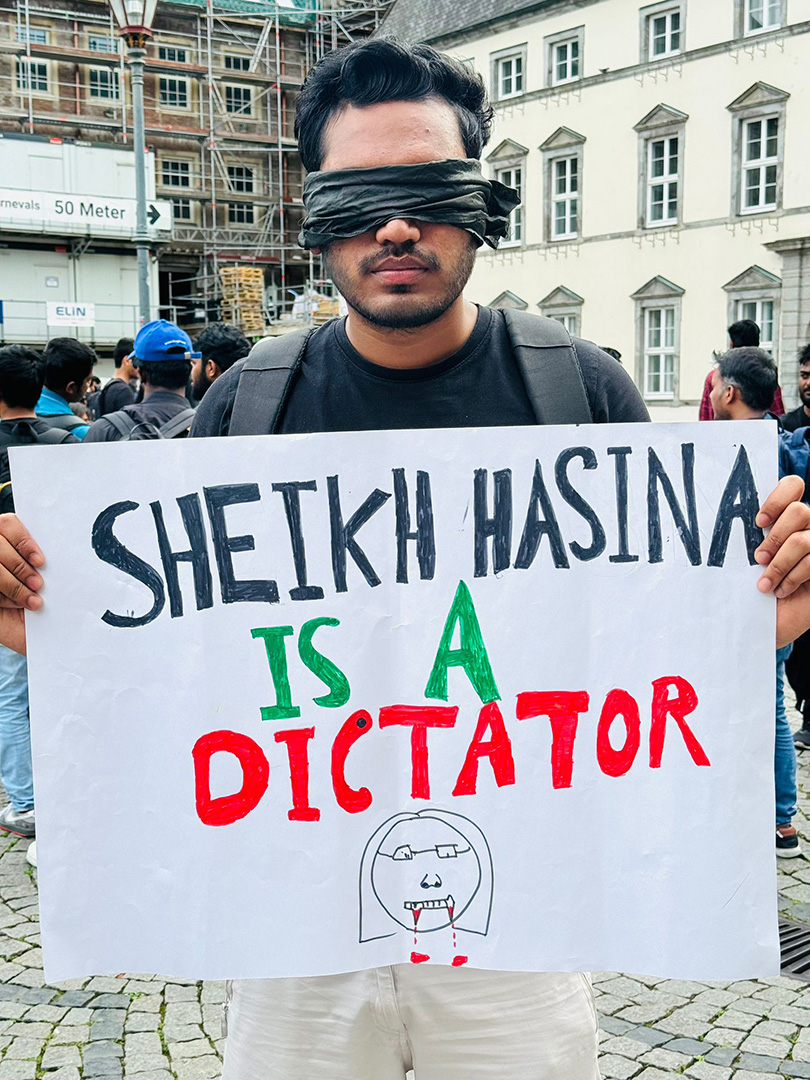
MT Team: How did the BD’s disorder affect you?
Zim: When I saw the videos of BD’s government killing students, I broke down. Let me confess, I never felt like that before. It felt as if the government could go to any extent. The use of brute force was bad.
MT Team: Did you have any safety concerns about your family and; friends during the turbulence?
Zim: Along with my family and friends, I had been worried about everyone in my social circle physically there in Bangladesh. However, since the takeover by the new government, I feel things are calming down and I have to worry less about my people.
MT Team: What change could you think youth can bring to the Bangladesh?
Zim: These protests made me realise the power of youth, the ‘feel’ that we are being heard, and the importance of our decisions. The youth dared to challenge the corrupt system. So, my eyes are on the youth to reshape Bangladesh. I believe in seeing a better and greater future for Bangladesh. Especially, as a student, I hope there will be equal job opportunities and the system will shift to a merit-based.
MT Team: What hopes, if any, have you pinned on the interim government?
Zim: I would say, firstly, the new government is expected to mend the corrupted public and private sectors and reform the 15-years-long corroded system. Then, devoted personnel should be appointed to top positions. Also, economic reforms should be taken on board.
MT Team: Do you think the protests in Bangladesh were purely a product of the student movement? Or any political parties were pulling the strings backstage?
Zim: Well, I would say that it all started as a student movement. Initially, it was students who raised their voices. Public, political parties and people from other walk of life joined in later.
MT Team: Did you, in some way, back the student movement in Bangladesh?
Zim: Yes, I was digitally, thereby connecting with my friends. But overall, it was hard to support properly. I could not do much, but just raise my voice on social media.
MT Team: Do you see a better and progressing Bangladesh in the future?
Zim: Yes, with Bangladesh finally having broken the tyranny bubble, my hope has amplified and is tied to the interim government and youth. I see the youth positioned high in morale. I put my confidence in that and I await growing up as a nation to hit new heights of success.
